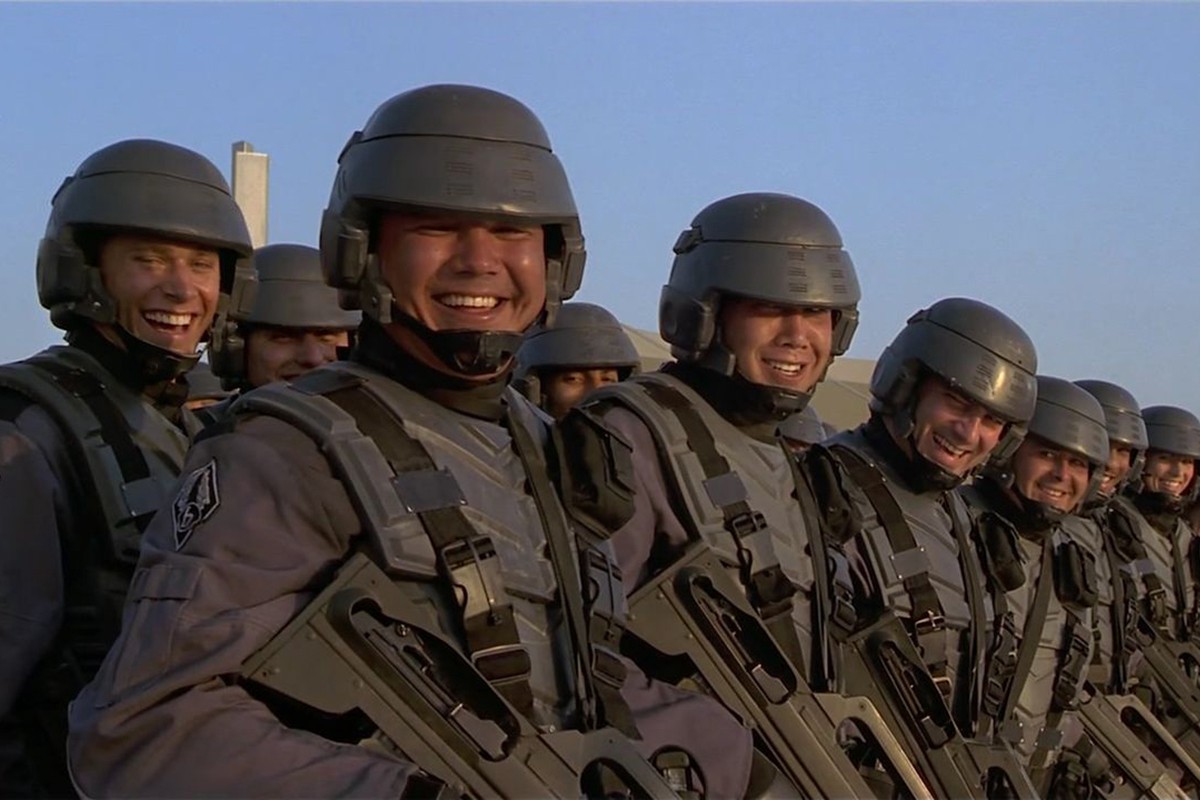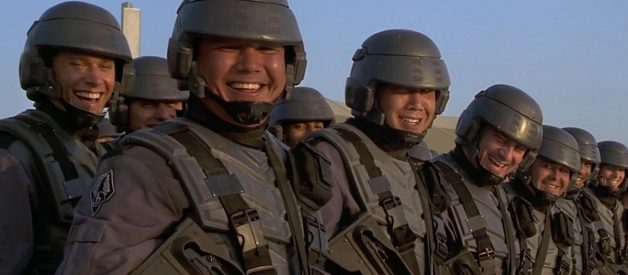 Image credit: Sony Pictures Home Entertainment
Image credit: Sony Pictures Home Entertainment
Paul Verhoeven?s Starship Troopers (1997), written by Edward Neumeier and based on the 1959 science fiction novel of the same name by Robert A. Heinlein, had its twentieth anniversary in 2017. And surprisingly, it still holds up, which is more than can be said for other films rounding out two decades worth of existence. (I?m looking at you Speed 2: Cruise Control (1997), Batman & Robin (1997), Spawn (1997), Steel (1997), Mortal Kombat: Annihilation (1997), Alien: Resurrection (1997), and whatever the fuck George Lucas was thinking with those re-release Special Editions of the original Star Wars trilogy.) In fact, if anything, I would argue it?s even better now, viewed through our ?darkest timeline? Trumpian lens of 2018.
If you?re not familiar with the film, here?s a quick primer: It?s the future, and humanity has been unified under a militaristic world-government known as The Federation. With all our intra-political shenanigans ironed out off-screen, humanity sets out to spread this age of peace and prosperity to the galaxy. But wait, there?s a problem. We?ve accidentally stepped on the Arachnids, a seemingly unfriendly and overly-aggressive alien race simply (and somewhat reductively) known as ?The Bugs?. They don?t take kindly to this intrusion of meat-sacks on their home turf, retaliating by flinging meteors our way through the cold, hard vacuum of space, and so naturally, they must be stopped (read: eliminated). Cue a two-hour film that?s equal parts sappy love-triangle and sci-fi bloodbath, featuring nave teenagers caught up in love, war, big shiny starships and KILLING BUGS, MAN. If any of this sounds up your alley, then you?re in for a real treat.
Now, to say that I love Starship Troopers a whole lot is a significant understatement; however, it?s also so much more than a horrendously gory and deliciously cheesy sci-fi B-movie. It?s a smart, biting satire on nationalism, the military-industrial complex, fascist ideology, the nature of war, and violence as ?the supreme authority from which all other authority is derived.? The film features overt Nazi symbolism as futuristic gestapo fashion, some scene-for-scene newsreel vignettes lifted straight from WWII propaganda films like Frank Capra?s Why We Fight and Leni Riefenstahl?s Triumph of the Will, plus over-the-top gore (of both the human and Bug variety) and on-screen deaths numbering in the hundreds. As a young and impressionable nerdy kid transfixed by the mawkish optimism of Star Trek, I eagerly watched Starship Troopers in the cinema at age nine with the benefit of parental supervision. While my birth-givers cackled away at the sheer lunacy and MA15+ violence of Verhoeven?s spectacle, while also thoroughly enjoying my apparent discomfort, I had my view of sci-fi, and cinema in general, sufficiently warped in ways that wouldn?t become immediately apparent until I watched Verhoeven?s Robocop (1987) later as an adult and cackled mirthfully myself.
On the surface, Starships Troopers is a dark, violent and comic pop-corn film; or, as Benjamin Svetkey over at Entertainment Weekly put it, a ?run-of-the-mill glossy, over-budgeted, check-your-brain-in-the-lobby sci-fi event flick.? Yet underneath the viciously dismembered troopers, pooling blood and practical special effects, beats a subversive political heart. Sure, for the casual viewer, the film may play out as ?90210-in-space,? with the added visual aesthetic of the Hitler Youth, but for Verhoeven (a Dutch national, who grew up in the Netherlands during Nazi occupation in WWII) that?s precisely the point ? as he states in the film?s DVD commentary, the central takeaway message of Starship Troopers is that ?War makes fascists of us all.? The key to understanding why Starship Troopers is so effective in its satirical skewering of war and fascist ideology hinges on two important aspects:
- The core ideas behind Heinlein?s original narrative, along with Verhoeven and Neumeier?s departure from these ideas; and,
- How a particular mode of parody, prevalent in Soviet-era politics, can be applied to Starship Troopers and Verhoeven?s Hollywood oeuvre.
Originally drafted as a separate script under the (admittedly awful) title Bug Hunt at Outpost Nine, Verhoeven and Neumeier noticed connections between their own story and Heinlein?s novel, and set about acquiring the licensing rights to adapt the story and its characters. The novel Starship Troopers (1959) is considered a landmark within the science fiction genre; Heinlein won the Hugo Award for Best Novel in 1960 (essentially the Pulitzer Prize equivalent for the sci-fi/fantasy genre; trust me, it was a big deal), and was praised for his depiction of a technologically advanced human society and future military.
While the novel?s impact and influence on science fiction should not be underestimated, alongside Heinlein?s significant body of work as one of the genre?s premier authors, like most things from the 50s ? e.g. institutional racism, workplace misogyny, and high-cholesterol diets ? it has not aged particularly well. It?s essentially ?a series of stern lectures on the subject of the value of military service and citizenship?; a gung-ho, pro-war YA novel that?s patriotic to the point of tedium. As Verhoeven himself admits in a profile with Empire magazine, originally published in 2012:
?I stopped after two chapters because it was so boring? It is really quite a bad book. I asked Ed Neumeier to tell me the story because I just couldn?t read the thing. It?s a very right-wing book. And with the movie we tried, and I think at least partially succeeded, in commenting on that at the same time.?
In the version of Starship Troopers released to audiences (and miraculously approved by studio executives and censors), Verhoeven took the right-wing, conservative and overly-nationalistic elements of Heinlein?s novel to their logical ? and somewhat frightening ? extremes, balancing the tone of the film?s serious elements with a furious blend of satire and self-parody. Yet the tone of Starship Troopers and Verhoeven?s overall agenda with the film reaches beyond the boundary of everyday safe satire, moving into the obscure and murky territory of stiob: a Russian term coined doing the tumultuous period of Soviet-era politics (pronounced ?STEE-YOP? for those non-Russians playing at home).
As culturual anthropologist Alexei Yurchak notes in Everything Was Forever until It Was No More: The Last Soviet Generation (2006), what makes stiob different from ?sarcasm, cynicism, derision or any of the more familiar genres of absurd humor,? is that it requires a degree of overidentification with the ?object, person, or idea at which [it is] directed? (250). This overidentification, i.e. intense commitment and/or follow-through, meant that the political intentions of stiob were often left deliberately ambiguous, making it near ?impossible to tell whether it was a form of sincere support, subtle ridicule, or a peculiar mixture of the two? (250).
In a film where humanity can travel between the stars in the 23rd century, yet chooses to fight giant aliens with Vietnam War-era weaponry, where career advancement comes only through the sudden deaths of friends and fellow troopers (often casually brushed aside with a dazzling smile), and characters dressed like Nazi SS stormtroopers dead-pan phrases like ?Come on you apes, you wanna live forever?!? and ?They sucked his brains out? ? it should become immediately obvious what tone Verhoeven was ultimately going for. Growing up in a Europe devastated by the rise of Nazi Germany, it seems patently absurd that Verhoeven would want to, or set out to, make a seemingly pro-war, fascist-endorsing film. However, by also operating from within the Hollywood system during the 80s and 90s, Verhoeven was able to draw loose parallels between the fall of the Soviet Union and the rise of globalization and American imperialism, allowing him to effectively utilise stiob within Starship Troopers and flip the McCarthy-era sloganeering of Heinlein?s patriotism on its head. As Yurchak details in a 2010 interview with Jessica Lockrem for the Cultural Anthropology journal:
?[I]n the cases when stiob is initially mistaken for a sincere statement, there is always another moment later on, when that statement is recognized as parody or when the hoax is exposed. This later moment is also part of the stiob procedure. So, whether stiob is recognized as parody right away or much later on it may still be subversive.?
In an emphatic 2013 op-ed piece for The Atlantic titled ?Starship Troopers: One of the Most Misunderstood Movies Ever,? Calum Marsh observes that the film is ?a ruthlessly funny and keenly self-aware send-up of right-wing militarism. The fact that it was and continues to be taken at face value speaks to the very vapidity the movie skewers.? And as Verhoeven acknowledges in his Empire profile: ?All the way through we were fighting with the fascism, the ultra-militarism. All the way through I wanted the audience to be asking, ?Are these people crazy???
Upon the release of Starship Troopers, Verhoeven?s form of ?precisely calibrated irony? had two effects on its largely American audience: those familiar with Heinlein?s novel bought in on the premise of adaptation immediately, disarmed by the recognition of title and story line, but were instead treated to an entirely different rendering of Heinlein?s militaristic future; while those who had no prior knowledge of the novel walked in blind, confronted by ?a subtle political and psychological critique of the authoritarian mind,? with dashes of the ultra-violence and sensationalism that had come to be hallmarks of Verhoeven?s Hollywood oeuvre. (Most notably, the two other films within his subversive sci-fi triumvirate: Robocop, and the Arnold Schwarzenegger action vehicle Total Recall (1990), an adaptation of the Philip K. Dick short story, ?We Can Remember It for You Wholesale? (1966).)
Discussing one of the most infamous scenes in Starship Troopers ? the co-ed boot camp shower scene ? Verhoeven explains that he wanted to show ?these so-called advanced people are without libido. Here they are talking about war and their careers and not looking at each other at all! It is sublimated because they are fascists.? Verhoeven then illuminates the exact zone of cognitive dissonance to be found within American cinema, which makes it so vulnerable to the subtle penetration of stiob: ?Of course Americans get more upset about nudity than ultra-violence. (?) A bare breast is more difficult to get through the censors than a body riddled with bullets.?
Ultimately, deciding whether Verhoeven succeeded in delivering this message or not appears to be a matter of perspective. Commercially, in terms of overall box office gross, Starship Troopers barely made back its $105 million production budget; while not a flop necessarily, it wasn?t exactly James Cameron?s Titanic (1997) either. Critically, the film was also near-universally panned and derided upon release. Revered film critic Roger Ebert ? who praised the social satire of Verhoeven?s earlier film Robocop (1987) ? claimed Starship Troopers lacked ?exhilaration and sheer entertainment,? and suggested that classifying the film as ?the most violent kiddie movie ever made? had more to do with critical accuracy rather than being a straight insult. Writing for The New York Times, Janet Maslin was similarly dismissive of the film, acknowledging that while Verhoeven certainly had a way with ?crazed, lurid spectacle,? his sci-fi venture was nothing more than a ?full array of raunchiness tailor-made for teen-age boys: savage bug battles, very messy casualties and a co-ed shower scene.?
In the late ?90s, Verhoeven?s satirical space romp seemed to zoom over the heads of audiences and critics alike at near warp speed; however, in recent years, Starship Troopers has managed to re-orbit those same critical circles with a newfound status as a bona-fide cult-classic. The film appeared at #20 on Slant magazine?s list for ?The 100 Best Films of the 1990s,? beating out other cult films like David Fincher?s Fight Club (1999), Paul Thomas Anderson?s Boogie Nights (1997), and The Coen Brothers-helmed Fargo (1996). Writing for The AV Club, critic Ignatiy Vishnevetsky included the film in a round-up selection for ?The Best Films of 1997,? hailing Verhoeven?s film as ?shameless as it is subversive,? while also declaring it to be the ?One of the most merciless satires of its time?.
Perhaps more importantly, Verhoeven has made no effort to hide or obfuscate his subversive agenda. As actor Michael Ironside ? who plays the rhetoric-spewing, hard-nosed civics-teacher-come-Roughnecks-commander Lt. Jean Rasczak (pronounced ?RAT-CHECK? for those non-Slavs playing at home)? explains, when the director was asked why he was making what seemed like a pro-fascist, right-wing film, Verhoeven replied:
?If I tell the world that a right-wing, fascist way of doing things doesn?t work, no one will listen to me. So I?m going to make a perfect fascist world: everyone is beautiful, everything is shiny, everything has big guns and fancy ships, but it?s only good for killing fucking Bugs!?
And it?s this relentless adherence to joyful cynicism ? precariously balanced along the razor?s edge of American stiob ? juxtaposed against the galactic landscape of an arguably dire future, that I believe gives Starship Troopers it?s true subversive power and goes a long way to establishing its place among the all-time greats of the science fiction genre. As critic Richard S. He notes:
Starship Troopers treats both its characters and audience like the butt of some grand, cosmic joke: that it?s impossible not to cheer, even if we should know better. The finale?s so rousingly celebratory it nearly erases all the horrors that came before; so effective it deliberately undercuts the subversiveness of Verhoeven?s own film. That?s why Starship Troopers is one of the great lowbrow films: Verhoeven doesn?t really need you to get whatever points he?s making, but he?d be really offended if you weren?t entertained. It?s more effective if it?s fun anyway, right?
Starship Troopers is one of those rare films that ?indulges in the horrors of war and the joys of watching it vicariously,? which, to put it succinctly, is kind of the whole appeal of watching a bunch of teenagers laugh, love and fuck each other before being savagely torn limb from bloody limb. It?s both wrong and right at the same time, almost self-reflexively so; like a Moebius strip of highly enjoyable, endlessly quotable, cinematic bad taste.
And in truth, arguing whether the deeper layers of meaning to be found within Starship Troopers are worth exploring is unfortunately too big a task for the scope of this article. (Why by no means an exhaustive selection of critical studies, here?s a few good places to start: ?The Intergalactic Final Solution: Nazism and Genocide in Paul Verhoeven?s Starship Troopers? by Brian E. Crim, ?Our Future ? Our Past: Fascism, Postmodernism, and Starship Troopers (1997)? by Florentine Strzelczyk, and ?SS Troopers: Cybernostalgia and Paul Verhoeven?s Fascist Flirtation? by Jeffrey Cass.)
However, when viewed through the satirical lens of American stiob and our current dystopic political landscape, Verhoeven?s subversive legacy resonates now louder than ever before. In the end, by taking Heinlein?s pro-nationalist military adventure tale for juveniles and warping it into a frighteningly comic, hyper-violent spin on ruthless ideology gone wrong, Verhoeven ended up doing his part for the science fiction genre. And thankfully, still watching it twenty-plus years on, I can too. The question is, will you?
?WOULD YOU LIKE TO KNOW MORE??
A version of this article was originally published in print for The University of Queensland?s Jacaranda journal in 2018.
Works Cited
Yurchak, Alexei. Everything Was Forever until It Was No More: The Last Soviet Generation, Princeton UP, 2006.


